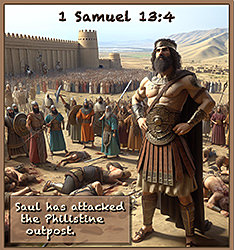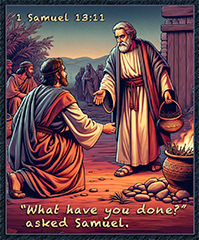1 Samuel 13:1–23 . . . Bible Study Summary with Videos and Questions
“Samuel Rebukes Saul”
The next three chapters document Saul's disobedience to the revealed will of God, which resulted in his disqualification as Israel's king. His failure proved to be God's instrument of discipline on the people as a whole because they demanded a king. Failure followed their disregard for God's Word. Obviously, Saul had a problem in relation to Samuel. On one hand he owed his appointment to Samuel, but on the other hand he was taking over Samuel's position as Israel's leader. Samuel spoke frequently of the wickedness of the people in requesting a king, apparently implying that he, Saul, shouldn't really be in office. Yet Saul hadn't sought to be king; he would have preferred, at least at first, to have been left in obscurity, but he hadn't been offered an option. Too many signs had been given that he was God's appointee, and prayers for deliverance from the Ammonites had been marvelously answered. He was king by divine anointing, by God's overruling of the sacred lot, and by united popular demand. He'd caught the people's imagination. They wanted a hero; against all odds, he was expected to pass muster.
Had Saul realized it, he could have gained much by having a seasoned prophet like Samuel alongside him, ready to guide, instruct and, if necessary, rebuke. Above all, Samuel was an intercessor who knew the Lord's mind and saw answered prayer.
[Note: Click the link to This Week’s Passage near the bottom of this page to read today’s Scripture.]
Saul and His Troops Quake in Fear (13:1–7)
Note: Verse 1 presents a few omitted words. You'll see that when you compare one Bible version with the next. Some things got lost in time. In this case, the age when Saul started to reign isn't revealed, neither is the exact length of his reign.
Perhaps more interestingly, Saul’s kingly reign started out with a bang. Under his leadership, God delivered many Israelites from a humiliating surrender to Nahash, the leader of the Ammonite army that threatened the inhabitants of the city of Jabesh, Gilead. To accomplish this, a volunteer army of 330,000 Israelites was summoned (11:8). After this victory, volunteers returned home and Saul retained a small, professional, standing army of 3,000 men — Israel's first "regular army." Previously, it had only a militia that assembled in times of national threat.
2Saul chose three thousand men from Israel; two thousand were with him at Mikmash and in the hill country of Bethel, and a thousand were with Jonathan at Gibeah in Benjamin. The rest of the men he sent back to their homes (1 Sam. 13:2).
This is the first mention of Saul's son Jonathan. He'll become a prominent and wonderful part of this first Samuel book. We'll see him changing this tense situation, without his father’s knowledge or permission. Saul had divided his troops: He kept 2,000 men with him, stationed in Mikmash and in the hill country of Judea, putting the remaining 1,000 men under Jonathan’s command, stationed at Gibeah. From what we know of Jonathan elsewhere, it seems that his actions were prompted by faith. After all, God gave this land to the Israelites, instructing them to drive out the nations dwelling in their land. Being obedient to God, he led his men in an attack of the Philistine garrison at Geba, located approximately 6 miles north of Jerusalem, about half-way between Gibeah to the south and Mikmash to the north.
Jonathan was a remarkable military leader. He repeatedly demonstrated the ability to lead a successful attack. Israel had enjoyed "peace," being a subjected people. Through this attack, however, Jonathan proclaimed, We won't accept our place of being subjected people any longer. So long as the Israelites stayed in their weak, defeated "place," the Philistines accepted the Israelites as their subjects. But as soon as the Israelites showed boldness in the LORD, by being willing to battle against the LORD's enemies, the Philistines considered the Israelites "obnoxious," "an abomination," "a stench." Jonathan's attack of this garrison was viewed as an "attack against Philistia," a monumental insult. As our text puts it, “Saul has attacked the Philistine outpost, and now Israel has become obnoxious to the Philistines" (v. 4).
Plainly, Saul took the credit for Jonathan's bold attack on the Philistine outpost (v. 4). This was a sign of Saul's bad character. His own sense of insecurity wouldn't allow any of his associates (even his own son) to receive credit. In response to Jonathan's attack, the Philistines had come, destined to make the Israelites pay for their war effort. They came with 30,000 chariots, 6,000 horsemen, and so many foot soldiers that their numbers were as many as the sand on the seashore. They came up against Israel, camping in Mikmash, where Saul had been stationed just recently with his soldiers (vv. 2, 5).
Jonathan had been bold enough to launch the initial attack against the Philistines. But the men of Israel weren't bold enough to stand strong against their enemy. In great fear, the Israelites hid in caves, thickets, rocks, holes, and pits, or fled across the Jordan River to the lands of Gad and Gilead, as shown in v. 7. This was Israel's low point. As for Saul, he was still in Gilgal where his kingship had previously been confirmed (11:15).
Saul had no choice but to return and attempt to defend himself against this Philistine attack. Trying to put his best foot forward, he blew the trumpet that summoned the nation to battle again. Jonathan was under Saul’s authority, but it appears as though Saul didn't want to admit that he'd acted passively while Jonathan took a very hearty action.
Comparing the situations in chapter 11 (highlighted in our summary of 1 Samuel 11:1–15) with chapter 13, they appear to be quite different. In chapter 11, Saul was Spirit-empowered when he became angry and forcefully called all Israel to fight the Ammonites. Here, Saul isn't said to have been empowered by the Spirit, and he was certainly less forceful when calling the nation to war. He summoned the Israelites, but far fewer than the earlier 330,000 showed up. Those who presented themselves for battle did so tentatively. When the Israelites learned the size of the Philistine army, they were terrified and began to hide and desert.
8 He waited seven days, the time set by Samuel; but Samuel did not come to Gilgal, and Saul’s men began to scatter (1 Sam. 13:8).
Samuel’s instructions were very specific: Saul was to go to Gilgal and wait for him to arrive, which would be seven days. Samuel was to offer burnt offerings and peace offerings. But Saul got nervous and summoned Samuel to the battlefield to make an offering to God. During his seven-day waiting period, Saul was in agony. He watched his army shrink; his soldiers vaporized in terror. Every day, as the situation grew increasingly more dangerous, soldiers fled for their lives. Some darted across the Jordan (v. 7) while others were apparently willing to save themselves by joining the Philistine troops (see 14:21). Those who stayed with Saul were shaking in their boots. Although they honored Saul as king, they were petrified. How much better it would have been if Israel had trusted the LORD here!
Samuel Rebukes Saul for Being Impatient (vv. 8–15)
The next eight verses show increased tension between Samuel and Saul. When Samuel hadn't arrived when expected, Saul independently made his own offering (which was a big "no, no"). As you might have expected, Samuel arrived just after Saul's sacrificial offerings. Saul tried to explain the situation to Samuel, but Samuel pretty much told him that God needed to take the kingdom away from Saul. Let's look at a few of this exchange's details.
Saul, the clockwatcher, managed to make it through six days and most of the seventh. But when that seventh day began to draw to an end, Saul and his patience reached their limit. He'd been in Gilgal for many months. Given the current crisis, every day took on more importance. Seeing his troops scattering, Saul began to take action, issuing orders for the burnt offerings and the peace offerings to be brought to him for his personal sacrifice, which was plainly sinful; no mention is made of a priest taking part in the ceremonial offering. Saul seems to have placed great importance on this offering. How easy it would have been for him to look at his offering as the means to Israel’s deliverance. Just as the Israelites looked upon the ark of God as a kind of secret weapon, Saul might have seen his burnt offering as a means of assuring God’s action on Israel’s behalf. If so, it's no wonder that Saul was so eager to start his sacrificial offering, with or without Samuel's presence.
No sooner did Saul finish sacrificing the burnt offering, Samuel arrived (v. 10). Apparently, if Saul had trusted God and waited a few more minutes, Samuel would have arrived, as scheduled, in time to offer the burnt offerings and the peace offerings. In an attempt to explain what he'd done, Saul went outside to greet Samuel. It wasn't Saul who stood there with his hands on his hips, rebuking Samuel for being too late; it was Samuel who asked Saul what he'd done; his explanation (vv. 11–12) fell flat, telling Samuel, The people were deserting me and you hadn't come by the appointed time. Samuel wanted to hear Saul's confession and repentance. Instead, although Saul didn't want to conduct his sacrifices without Samuel, he cited the Philistines assembling for battle at Mikmash as the reason for his actions; he feared a pending attack from them while at Gilgal.
Samuel's response was direct and stern because Saul had acted foolishly, having willfully disobeyed Samuel’s clear and direct orders; his disobedience would cost him his dynasty. Although his reign wouldn't be immediately terminated, his kingdom wouldn't endure, and his sons would never sit on his throne. However, had Saul obeyed God's command, his kingdom would have endured for generations. We'll soon see that God had already sought out and chosen a man whose heart was harmonically in tune with his to replace Saul. [Stay tuned for this new development.]
Samuel proclaimed God's judgment upon Saul's household. He indicted Saul decisively when he said, “You have done a foolish thing. You have not kept the command the Lord your God gave you" (v. 13a). God commanded Saul to do something, but he did the opposite. Then Samuel added, ". . . if you had, he would have established your kingdom over Israel for all time" (v. 13b). The whole point in being a king was to establish a dynasty, where one's sons would sit on the throne afterwards. God told Saul indirectly that his descendants wouldn't not reign after him and that, though he was king, he'd never establish his monarchy in Israel. [Incidentally, instead of being immediately "impeached" by Samuel, Saul would reign for twenty more years.]
Though God had rejected Saul, he hadn't rejected Israel. He loved Israel, having raised up the next king as a man after His own heart (v. 14). Looking for such a man, God found him in an unlikely place. In fact, he wasn't a man at all! Clearly in v. 15, it doesn't seem that Saul was at all shaken by Samuel’s words, nor was he repentant. Instead, he busied himself by numbering his meager military might, composed of some 600 men, down from about 3,000 in his regular army. The loss of so many men was probably the reason Saul offered the sacrifice without Samuel; it also displayed a heart of distrust and disobedience to God. Samuel then arose and departed for Gibeah, in Benjamin.
Israel at War Without Weaponry (vv. 16–23)
After reading these six verses, you probably envisioned something of a standoff between the Philistine army, stationed at Mikmash, and the Israelite forces under Saul and Jonathan, stationed at Geba. But that's not quite the case. While the main Philistine army was seemingly dug in at Mikmash, three parties of “raiders” were sent out. They appear to have been “special forces” troops; their task was to kill, burn, or otherwise destroy human life, cattle, buildings, and crops. The longer these raiding parties were free to bring destruction, the more serious Israel’s situation became. So grossly outnumbered and desperately frightened were the Israelites that they deserted in droves. If the Philistines weren't defeated and driven out of the land, much trouble would lay ahead for Israel.
To Iron Age had come to the seafaring Philistines who traded with technologically sophisticated cultures to the west, especially the Greeks, importing weapons and the smelting know-how from distant lands. Such technology enabled the Philistines — the first people in Canaan to process iron — to have iron swords, spears, and chariots with iron wheels. The Israelites hadn't yet realized such technological advances. The Philistines routinely sold iron farming implements to the Israelites, but never sold or allowed them to make and possess iron weaponry, giving the Philistines a decisive advantage over the Israelites. Of the 600 troops in Gibeah, only Saul and Jonathan possessed swords (v. 22), since only the royal family could be properly equipped! The rest of Israel fought with whatever they could find. The outlook for the Israelites was dismal. The only way they could ever win was to trust in God for everything!
Agriculturally for the Israelites, they were virtually dependent upon the Philistines. They had to purchase their farming tools from them, then pay to have them sharpened. Every day, the Israelites were reminded of their subjugation to the Philistines. And, militarily speaking, things were hopeless for the Israelites. The Philistines had a massive, well-equipped army and raiding parties, roaming in Israel at will and bringing death and destruction with them. Israel has a small collection of very frightened men, many of whom were deserting while others had already defected to the Philistines (see 14:21). The closing verse, 23, announces the start of battle, which we'll engage in next week.
† Summary of 1 Samuel 13:1–23
This passage describes a challenging moment early in Saul’s reign involving his first battles against the Philistines. Saul chooses 3,000 men to fight; 2,000 remain with him at Michmash, and 1,000 are with his son Jonathan at Gibeah (13:1–2). Jonathan strikes a Philistine garrison at Geba, which provokes a large Philistine army — 30,000 chariots, 6,000 horsemen, and countless foot soldiers — to assemble at Michmash. The Israelites become terrified and scatter, hiding in caves and other places (vv. 3–7).
Samuel had instructed Saul to wait for him at Gilgal for seven days before offering a sacrifice and seeking God’s guidance. When Samuel doesn’t arrive on time and the troops begin to flee, Saul takes matters into his own hands and offers the burnt offering himself (vv. 8–12). Just then, Samuel arrives and rebukes Saul for his disobedience, stating that Saul’s kingdom will not endure and will be given to another “man after God’s own heart” (vv. 13–14). The chapter closes by describing the Philistines’ superior weaponry due to the Israelites’ lack of blacksmiths and how the people relied on Philistine craftsmen to sharpen their farming tools, highlighting Israel’s disadvantage in armaments (vv. 15–23).
Key points with verse references:
• Saul organizes an army, and Jonathan’s victory at Geba triggers a large Philistine response, causing fear and desertion among Israelite troops (vv. 1–7).
• Saul is commanded to wait for Samuel to offer a sacrifice, but in impatience and fear, he disobeys and offers it himself (vv. 8–12).
• Samuel rebukes Saul, predicting the loss of his kingdom and the rise of a man after God’s own heart (vv. 13–14).
• The Philistines’ military advantage is underscored by their control of blacksmithing, ironically forcing the Israelites to rely on them for weapon maintenance (vv. 15–23).
• Saul’s failure to trust and obey God marks a turning point in his reign and foreshadows future challenges.
This Week's Passage
1 Samuel 13:1–23
New International Version (NIV) [View it in a different version by clicking here; also listen to chapter 13 narrated by Max McLean].
† Summary Video: “The First Book of Samuel”
† Watch this introductory video clip created by BibleProject on bibleproject.com.
- Q. 1 Why did all the troops wait at Gilgal for Samuel's return (v. 7–8)?
- Q. 2 Seeing the buildup of enemy troops, would you have waited seven days for Samuel? Why or why not?



